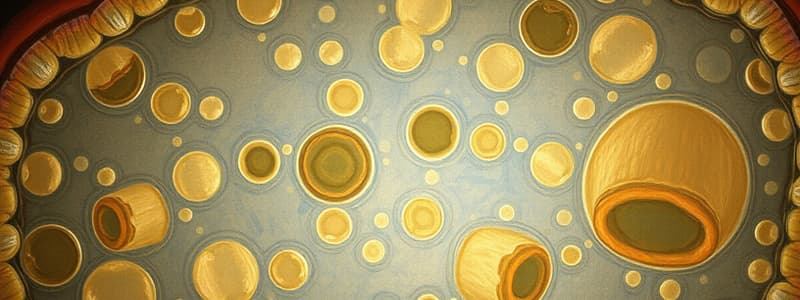Podcast
Questions and Answers
What is the thickness of the cell membrane as observed under low magnification?
What is the thickness of the cell membrane as observed under low magnification?
- 10 - 12 nm
- 5 - 7 nm
- 12 - 15 nm
- 8 - 10 nm (correct)
Which of the following is NOT a component of the cell membrane?
Which of the following is NOT a component of the cell membrane?
- Nucleic acids (correct)
- Proteins
- Carbohydrates
- Phospholipids
In the structure of phospholipids, what does the polar hydrophilic head face?
In the structure of phospholipids, what does the polar hydrophilic head face?
- The aqueous media (correct)
- The inner part of the membrane
- The hydrophobic tails
- The cytoplasmic environment only
How is the entire structure of the cell membrane referred to?
How is the entire structure of the cell membrane referred to?
What holds the phospholipid bilayer together?
What holds the phospholipid bilayer together?
Flashcards are hidden until you start studying
Study Notes
Cell Structure Overview
- Cells are basic functional and structural units of the body.
- Similar cells form tissues, which combine to create organs.
- Organs work together to form body systems.
Cell Membrane Characteristics
- Also known as plasmalemma.
- Invisible under light microscope due to thinness; visible through staining techniques.
Electron Microscopy (EM) Observations
- Low Magnification: Appears as a thin dense line, 8-10 nm thick.
- High Magnification: Reveals a trilaminar (three-layer) structure:
- Outer dense layer (extracellular leaflet)
- Inner dense layer (cytoplasmic leaflet)
- Middle lucent zone known as the unit membrane.
Molecular Structure of the Cell Membrane
- Composed of three main components:
- Lipid molecules (phospholipids and cholesterol)
- Protein molecules
- Carbohydrate molecules
- Cell membrane structure is consistent across various membranous organelles, with minor variations.
Lipid Molecules
Phospholipids
- Comprised of:
- One polar hydrophilic head, orienting towards aqueous environments on both sides of the membrane.
- Two long non-polar hydrophobic tails (fatty acids), which connect in the membrane's center and stabilize the bilayer through weak non-covalent interactions.
Image Description
- Illustrates cell membrane components including:
- Phospholipid bilayer
- Glycoproteins
- Glycolipids
- Highlights arrangement of hydrophilic heads and hydrophobic tails within the bilayer.
Studying That Suits You
Use AI to generate personalized quizzes and flashcards to suit your learning preferences.




